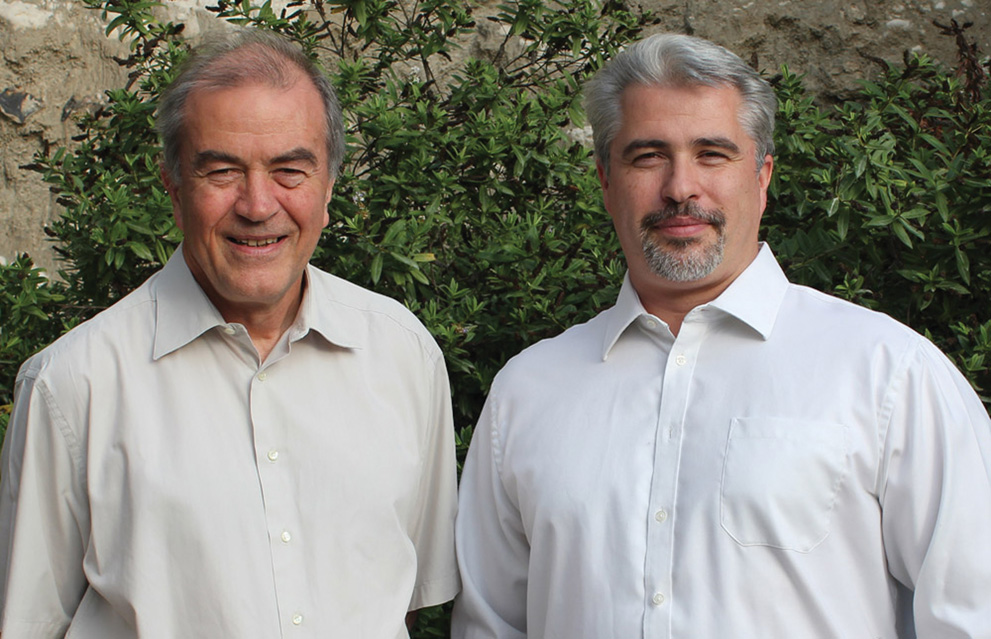Rebranding: CED Group
Stone landscaping product supplier CED is celebrating its 40th anniversary with a makeover. But this is no mid-life crisis.
Stone landscaping specialist CED is celebrating its 40th anniversary this year and decided it could do with a makeover. So at the Society of Garden Designers’ annual Awards presentations in London’s prestigious The Landmark Hotel in February, it officially unveiled its new look. As headline sponsors, the new branding was presented to the 400 or so guests at the event, who also received a power pack phone charger branded with the new logo as a table gift.
CED Stone Group chose to back this Awards scheme because it was the first of the year and the timing was right for the CED rebranding announcement, although CED Managing Director Giles Heap says he also likes what the awards stand for in excellence of landscaping design and execution.
Being headline sponsor meant Giles was able to present a five-minute video (professionally made by Michael Lebor of Lebor Films) about CED to the gathering and give a short talk about the new look.
“Feedback from the people there was very positive,” he says. “The branding exercise is about promoting what we can bring to the table.”
Along with the new look, which separates the landscape and commercial sides of the business, comes a new website and brochure, which are being phased in so customers see the updates in place throughout the 2018 seasonal peak.
CED Stone Group’s new style is a refresh of its classic branding, maintaining the concept of an established company with a recognised name in the industry respected for quality products, well informed advice and experienced people.
The new branding is intended to convey the message of CED Stone Group’s core values of expert advice, good customer service and the use of natural stone in the best way possible.
Giles Heap, who took over from his father, Michael, as Managing Director in 2013, says: “At the very heart of our business we want to share our passion for using the best hard landscaping products and encourage our customers to create beautiful landscapes that can be used to inspire future generations.
“A lot of things can change in 40 years and over time we’ve grown and evolved in many ways, so we hope this new and updated branding will help to reinforce how important our values are.”
CED Stone Group now has six depots in the UK and Ireland and an outlet in North America that is currently supplying granite paving and large elliptical planters for a project in Philadelphia, USA. That project came to CED through architects West 8 in London. CED and West 8 had worked together previously on Jubilee Gardens.
Ruan Ellis represents CED in North America, where, says Giles Heap, nothing quite like CED previously existed.
CED Stone Group employs just over 100 people in total and is recognised for holding an extensive and otherwise hard-to-find range of around 500 different kinds of natural stone and hard landscaping products, with many hundreds more available to order.
The new cedstone.co.uk website that accompanies the new look is designed to help customers find their way around that range, offering colour and stone type filters and matching product suggestions. It also includes material comparison tools.
Paula Chalmers, CED Stone Group’s Marketing Manager, says: “CED has changed and evolved over the years and our brand needed to reflect this, so we wanted a fresh, updated style that would still be relevant and recognisable to our customers. The two distinct parts of our business – CED Stone Commercial and CED Stone Landscape – have been given their own identities, ensuring we can communicate effectively with our clients, who have very different needs.”
Giles Heap adds: “We wanted to get the company ready for the future, both in itself and in its internal understanding of where we are. It’s a process. It’s taken about three years to do. It took so long because to do it properly we needed a real understanding of who we are and what were the values that got us to this point. It took a lot of introspective and honest naval gazing to get to the roots of what we do.”
One of the conclusions Giles came to was the value of the honesty and integrity that his father, Michael, who is still the company Chairman, imbued in the business.
 Michael Heap and his son Giles celebrating 40 years of CED. “It’s in our DNA,” says Giles. “It’s a genuine honour to work in this industry.”
Michael Heap and his son Giles celebrating 40 years of CED. “It’s in our DNA,” says Giles. “It’s a genuine honour to work in this industry.”
Of course, the criteria will be different for large, public realm projects with bespoke solutions than for domestic gardens where products can often come straight off the shelf. That was why CED wanted to separate the two divisions.
“What I wanted to do was give the two sides of our business – landscaping and commercial – a bit more of an identity… for their own internal logic and so clients have a better understanding of who they are dealing with and why.”
At the same time, of course, technology moves on inexorably and has to be updated. All websites should by now be responsive so they can be viewed on mobile phones. They have to be secure and the latest Google algorithm will also be ranking them on the speed of download. Websites have to respond to these changes as well as conveying the required message about the company. “We are a fully 365-days-a-year, 24-hours-a-day connected firm,” says Giles.
“I think it’s important we keep hold of where we are and where we come from, but we also understand that the world has changed and we want to keep on the same wavelength as the next generation of designers.”
Having determined what were the company’s strengths and how they should be taken forward, CED worked alongside Acumen, a branding agency based in Romford, Essex, to translate that visually into the new company image, both physically and online. An agency called Adtrack, who CED have worked with in the past, were tasked with helping to create the new website.
CED has decided not to include a shop on the website. It does, however, sell stone online through eBay, which came about as a result of a business it bought in the Wirral last year. But it is not how Giles thinks stone is best sold.
“It’s important to have a conversation about these products,” he says. “There are a lot of internet companies selling stone. Not many are good ones. For me the focus is the client, the design, and a technical understanding of the project.”
The purchase of Corfe Stone in The Wirral, Cheshire, last year gave CED its sixth depot. Few companies ever entirely rule out the purchase of other companies because sometimes opportunities arise that cannot be ignored. But Giles says such a move does not currently feature in his plans, which involve more of a consolidation of the CED position in the market through collaboration with complementary quality brands.
“At the moment I’m talking to a company about selling their steel furniture,” he says, “as it often complements the stone that we sell.”
CED already sells the CEDAdrive and CEDApath stabilisation systems, having had a long term relationship with the manufacturer, and the Tier stone panelling system, with its authentic drystone walling appearance.
It also sells Steintec mortars. And Steintec has helped CED to develop StoneBed PBM, a permeable bedding mortar for the domestic paving market to aid rainwater management and tackle frequently occurring issues such as efflorescence and picture framing.
Giles believes collaborations are a better bet than outright purchases at the moment because of the uncertainty of Brexit. But however many collaborations might evolve around other landscaping products, he is unequivocal: “Our focus has to be on natural stone.”
CED will source stone from anywhere in the world but likes to use indigenous materials, with their low carbon footprint, if the option is available.
It famously worked on sourcing the stones for the geological timeline at the British Geological Survey in Nottingham, opened in 2012, sourcing stone from the British Isles to represent every geological period.
It has helped a Scottish aeolian sandstone break into the landscaping market and includes Grampian granite among its standard ranges, as well as Caithness sandstone and DeLank Cornish granite. CED has just supplied a Moray green schist for paving and edging at The Natural History Museum.
These core values of the business are not changing, but Giles did not want to join his father’s firm without bringing a contribution of his own to it, which is why he has been working on the rebranding.
He first started working for CED 22 years ago after glandular fever interrupted his ‘A’ level studies. He did not stay there long and over the years has had a varied and colourful variety of experiences, including nine months with Gillson & Son’s quarry in Keighley, West Yorkshire.
Giles says when he returned to the family business he had no firm plans about staying there for any particular length of time. But, he says: “Stone has a way of getting under your skin. I got involved with design aspects and everything that goes along with that. I have found my passion... although it took me a while.”
And although CED is this year celebrating its 40th anniversary, its roots go back further. It started out as Civil Engineering Developments Ltd, formed in 1959 to devise applications for calcined flint within resin technology. In 1978 Michael Heap took over the business, recognising it had the basis to become a supplier of specialist aggregate and stone.
From very small beginnings CED has grown by satisfying market needs for natural materials, ranging from technical uses for fine dried aggregates to decorative pebbles and huge boulders, as well as a wide range of paving, setts and kerbing.
Michael Heap realised that by making the relatively unusual easily available, CED could elevate landscape architecture. In the field of paving, CED has promoted, encouraged and led moves to improve the hard surfacing of public and private areas, first by buying and holding stocks of large quantities of reclaimed granite setts, kerbs and York flags, and secondly by actively marketing a whole variety of new stone products.
Now with its six depots in the UK and Ireland, its branch in North America, and a broad and expanding range of products, CED is prepared to deal with the growth in demand that it has done so much to foster and which is so welcome in the higher standards seen in hard landscaping – private, public and commercial.
The landscaping industry recognises that stone is not only aesthetically pleasing but often more economical when compared with concrete on a whole-life basis – especially when CED has helped with the value engineering.

